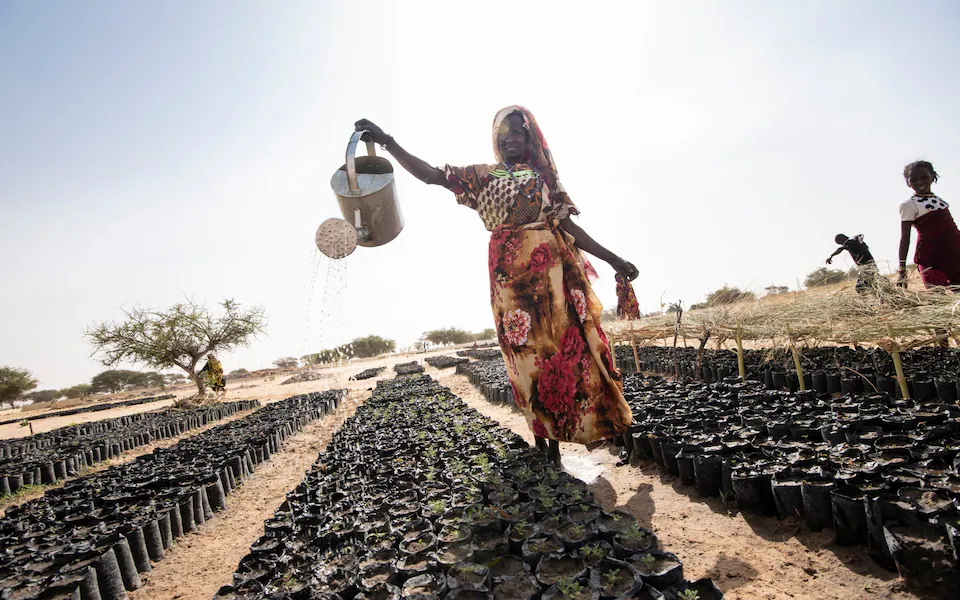Read in
Improved agricultural practices could sequester up to 23 per cent of global carbon emissions by 2050 CREDIT: Simon Townsley/The Telegraph
The world population could reach 10 billion by 2050. Every year, 30 per cent of the planet suffers from hunger, with this figure rising to 60 per cent in Africa. Yet, with its vast natural resources, Africa has the potential to not only feed its growing population – expected to reach 2.5 billion by 2050 – but also to significantly contribute to global food security.
African agriculture also plays a crucial role in combating climate change. Improved agricultural practices could sequester up to 23 per cent of global carbon emissions by 2050, according to the IPCC. Increasing agricultural productivity on already cultivated land is the only way to stop deforestation, which accounts for 10 per cent of global greenhouse gas emissions and is linked to 80 per cent of the expansion of cultivated land.
Agriculture accounts for about 60 per cent of employment in Sub-Saharan Africa. Massive investments in this sector could lift millions out of poverty. For instance, increasing agricultural yields by 50 per cent could generate as much as $300 billion in additional revenue by 2030.
Agricultural development is particularly essential for political stability and combating forced migration. A robust agricultural sector can prevent conflicts related to resources, reduce displacements due to famines and climate change, and create economic opportunities locally, thereby limiting migrations.
Investing in African agriculture amounts to investing in 13 out of the 17 United Nations Sustainable Development Goals (SDGs). In the context of declining Official Development Assistance (ODA) and stresses on public and private financial resources, maximizing the impact of collective investments is crucial.
Global investment remains insufficient
Africa has a common political vision for African agriculture that must be supported. The recurring divides in narratives opposing climate and agricultural development, as well as the agendas of countries of the North and those of the South, make any attempt at political alignment complex. Nowhere can a trace of a shared vision be found supporting African priorities – which are clearly defined in the declarations of Malabo (2014), Nairobi (2024), and the African Union’s Agenda 2063.
While African countries – accounting for less than three per cent of global greenhouse gas emissions – endure the most severe impacts of climate change, the requirements of ODA based on environmental criteria are perceived in Africa as an offensive violation of sovereignty. Political leaders and international donors must bear this in mind. It is therefore vital to work towards aligning agendas, for instance, by agreeing on a common definition of sustainable agriculture and investment standards.
In the absence of a shared vision, investments remain insufficient and inefficient. The African agricultural sector suffers from a significant deficit in public, private, and philanthropic investments. Through the Comprehensive Africa Agriculture Development Program (CAADP), African governments agreed to allocate at least 10 per cent of national budgets to agriculture, but only a few have met this target.
Only five per cent of the total ODA is directed towards African agriculture. Philanthropic contributions are also insufficient, representing less than one per cent of the necessary investments, and private investments are close to non-existent due to perceived risks. However, the FAO estimates that transforming African agri-food systems requires an investment of $200 billion annually.
Bringing people together
A broad multi-stakeholder initiative, led by the Paris Peace Forum, is emerging to address these governance issues. A coalition of over twenty major organizations from Africa and the rest of the world, representing a diverse range of actors and activities (international institutions, development agencies, businesses, research centers, philanthropic foundations, NGOs, universities), signatories of the Paris Peace Forum’s Call for Mobilization, are proposing a new South-North consensus centered on three main principles: Every country has a stake in the agricultural development of Africa. No country should have to choose between food security and environmental protection. Each country can choose its own path to sustainable agricultural development.
To turn these words into action, the Paris Peace Forum and its coalition launched the ATLAS initiative on June 10th, 2024, during an event organized in Morocco. ATLAS will be the high-level multi-stakeholder platform for policy dialogue that the world needs. ATLAS will bring together African and international policymakers to overcome current barriers and unlock the necessary investments, making it possible for Africa to sustainably harness its agricultural potential.
The destiny of the planet lies in the development of African agriculture. Directing investments towards African agriculture must be a priority, as in African agriculture lies our common good.
Pascal Lamy is Vice-Chair of the Paris Peace Forum and Former Director-General of the World Trade Organization; Ibrahim Mayaki is Special Envoy for Food Systems, African Union (AU) and Former Prime Minister, Republic of Niger



